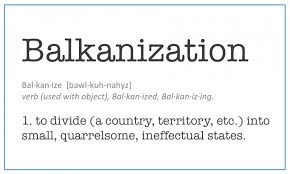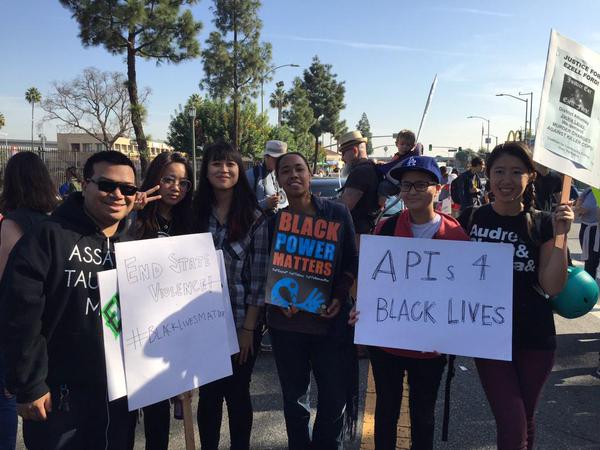
Last December, NYPD Officer Peter Liang fatally shot Akai Gurley, an unarmed Black civilian killed for entering the dark stairwell of the Louis H. Pink housing complex where Liang was conducting an unsanctioned vertical patrol. Earlier this year, Officer Liang was indicted by a grand jury in Akai Gurley’s death; the reaction from the Asian American community was swift.
Concurrent with Liang’s indictment and in the context of the earlier killings of unarmed Black civilians Michael Brown and Eric Garner, nearly 30 Asian American/Pacific Islander civil rights advocacy groups and organizations rapidly declared their solidarity with the Black community and the revived campaign to end excessive police force.
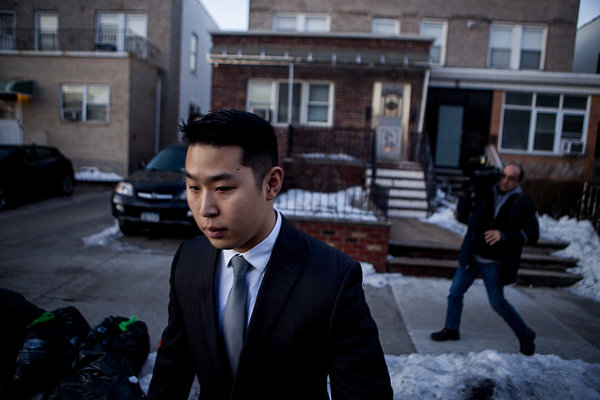
The Committee Against Anti-Asian Violence — a phenomenal NYC-based non-profit founded in 1986 that focuses on community organizing among low-income Asian Americans — summarized the thinking behind their support of Officer Liang’s indictment as it connects to broad Asian American solidarity with the #BlackLivesMatter movement; their statement read in part:
We put out this statement to be clear: that the murder of Akai Gurley is a part of the systemic targeting of Black people by the police, and that Officer Liang must be indicted. As a police officer, he is a part of the institutional injustice we see everyday with law enforcement. We demand an indictment of Officer Liang, just as we have with Darren Wilson and Dan Pantaleo.
…CAAAV: Organizing Asian Communities has been part of the anti-police brutality movement for decades because of our core belief that Asian and Asian American communities cannot be complacent with the current inherently flawed criminal justice system. We understand that the political and economic foundation of this country is rooted in anti-Blackness and that the criminal justice system is an extension of this foundation. Asian and Asian American communities who are often positioned as proof that racial uplift is possible despite this foundation, have more to gain from seeking justice than maintaining the status quo.
CAAAV puts out this statement with honesty and intention to highlight why we are calling for structural overhaul and police accountability, and to ensure there is no confusion in our communities on where we need to stand on the killing of Akai Gurley and others. The fact that Officer Liang is an Asian American shouldn’t mean that Asian Americans don’t call for justice for Akai Gurley. Quite the opposite — it should force us to examine how each of us is complicit in maintaining the status quo.
Many Asian American student groups tweeted their support. Asian American bloggers — myself included — penned numerous supportive thinkpieces: Emil Guillermo of AALDEF, for example, wrote two weeks ago about the Asian American community’s historic involvement with the Civil Rights Movement. Asian American activists traveled to Ferguson and Selma. Four weeks ago, AAPI protesters took to the streets in San Francisco during a Lunar New Year festival to demonstrate their support of the Tumblr-originated #Asians4BlackLives hashtag. Today, the Asian Art Museum in San Francisco is hosting a panel discussion on Asian American and Black solidarity (“Asian Americans and the New Racial Justice Movement”, 6pm, free with museum admission) and which will include among other notable guests Karissa Lewis of the #BlackLivesMatter hashtag.
It would be tempting to conclude from this avalanche of support that the Asian American community was united in their solidarity with #BlackLivesMatter. Indeed, that is the impression one might have gleaned from my own extensive reading of the online AAPI discourse I am part of, which expressed near-universal condemnation for the systemic lack of accountability of police officers — including Officer Peter Liang — who have killed unarmed Black civilians.
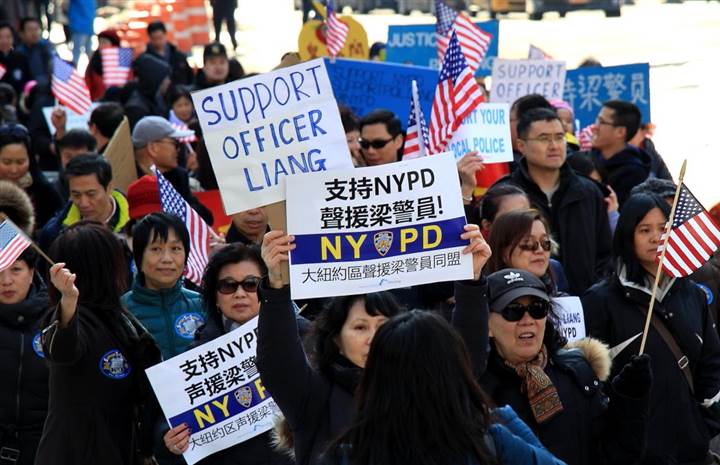
But, in parallel with these solidarity efforts, another movement was also growing within the AAPI community: one that implicitly condoned the murders of Michael Brown, Eric Garner and Akai Gurley while it mobilized to defend Officer Peter Liang in the wake of his indictment. Arguing that Liang should escape accountability in the same way that Brown’s killer (Ferguson Officer Darren Wilson) and Garner’s killer (NYPD Officer Dan Pantaleo) did last year, these pro-Liang supporters created a White House petition demanding that the charges against Liang be dropped (the White House, incidentally, cannot dictate the discretion of a Brooklyn District Attorney); that petition attracted 120,000 signatures in two months.
On March 10, two thousand protesters — most Chinese American — marched for Officer Liang in New York City. A spokesperson said that this rally was supported by 50 Asian American groups from around the country. Protesters lined New York City’s streets, bearing signs saying that Liang was being treated as a “scapegoat” and urging onlookers to remember NYPD Officers Wenjian Liu and Rafael Ramos, who were killed late last year in an alleged revenge killing for police brutality in Ferguson. Rally organizers hailed from the Coalition of Asian Americans for Civil Rights, a group with minimal web presence that appears to have been formed specifically in the wake of the Officer Liang indictment; the Asian American organization 80/20 has also expressed to its supporters interest in joining the efforts. On April 26th, pro-Liang organizers say they plan a second coordinated nationwide protest action and expect 6,000 to attend.
It is not surprising to me that the AAPI community might be divided on such weighty an issue as our own positioning within the larger racial justice landscape. As with any community, homogeneity of thought should neither be expected nor asserted. I think the Coalition of Asian Americans for Civil Rights have confoundingly and ironically positioned themselves in opposition to the Constitutionally-protected civil rights Fourteenth Amendment rights of equal protection and due process shared by both Peter Liang and Akai Gurley; however, I don’t really begrudge pro-Liang Asian Americans their right to participate in rhetorically problematic, racially suspect, and Constitutionally-uninformed political expression.
But how is it that these two parallel tracks of Asian American political expression could seem to be so rhetorically and organizationally divorced from one another?
In today’s narcisstic culture of social media-facilitated self-affirmation, it can be tempting to universalize one’s own experiences and perspectives. It is, after all, self-flattering to use one’s own “anecdata” to build an autocentric worldview that imagines each of us to be not just representative of ourselves, but of everyone’s lived experiences. It can be easy to mistakenly believe that “who we are” is “whom everyone is”. Even within the pro-Liang movement, for example, we witness the political opinions of some Chinese Americans being generalized as representative of all of Asian America regardless of ethnic and political differences. Meanwhile, one Asian American blogger — finding his own opinions on affirmative action so dissonant with that of other Asian American writers — penned an angry screed (“Affirmative Action, and the rift between Asian American media and the rest of us“) where he concluded that Asian American writers were over-educated liberals “out-of-touch” with the homogeneous, consensus opinion of Asian America — defined, of course, as his own anti-affirmative action opinion, writ large.
This blogger, was, of course, demonstrably wrong. A Harvard Law blog writing on the topic of Data Privacy suggested that “a little science” is the antidote of anecdote, and can go a long way towards separating fact from folklore. In the case of affirmative action, several national and state-wide surveys of Asian American political opinion repeatedly reveal that most (but not all) Asian Americans are in favour of such programs. Yet, for this blogger, the science failed to support his own anecdotal experiences, demonstrating how at the individual level, most of us isolate ourselves within politically like-minded social enclaves.
The way that we as digital citizens interact with the online and offline world has exacerbated our tendency to flatten difference by universalizing our own narratives. We navigate a self-selected social bubble populated predominantly by those whom we invite into our individualized social networks. When we survey those circles to glean popular opinion, we are mistakenly attempting to extrapolate data from a skewed sampling of people whom we have a priori filtered to agree with ourselves and applying it to the larger world without thinking about the impact of our own sampling bias. 75% of White people, for example, confess that they have no people of colour in their intimate circles of friends. In the absence of encountered multiculturalism, discourse informed by multiculturalism and racial difference is undermined.
A similar issue is evident in Conservative AAPI Discourse: the discourse that unites those who support Officer Liang with those who oppose affirmative action. I describe this discourse as “conservative” because, on the whole, its central philosophy is focused more on Asian American uplift within existing White power structures than with dismantling those systems of power, and is therefore fundamentally less radical. Yesterday, Alton Wang of Unhyphenate.Me pondered “the source of this energy”, noting that NBC News had reported that ethnic language media outlets including Chinese language newspaper World Journal appeared to be integral in building a pro-Liang narrative for its broad readership of Chinese American readers. NBC News also reported that these rallies were organized through WeChat and Weibo, two Chinese-language social media platforms.
Conservative discourse is politically — and linguistically — inaccessible to most AAPI, let alone people of other races: not only does it take place almost exclusively in Chinese-language media outlets, but it is centered specifically around Chinese American lived experiences. There is scant inclusion of Southeast Asian American or Pacific Islander voices, let alone pan-ethnic politics. Yet, a mere 22% of all Asian Americans self-identify as Chinese American. Thus, not only does this Conservative Discourse suffer by the exclusion of non-Asian voices (and race politics), but also through exclusion of the full complexity of AAPI voices. This Conservative Discourse lacks the sophistication attained by incorporating multicultural perspectives, and instead remains — either unintentionally or by design — Balkanized from the larger AAPI community. Is it any wonder, therefore, that ideas of Black solidarity and intersectional racial justice fail to make inroads here?
Before the rest of us get too self-congratulatory, Progressive AAPI Discourse suffers from similar Balkanization. The progressive AAPI blogosphere — rhetorical descendants of the pan-ethnic, coalition-focused Asian American Movement of the 1960’s, and of which I consider myself to be a member — appears to appeal predominantly to second-generation, English-language-proficient, college-educated AAPIs hailing from multiple ethnic backgrounds, and typically adopting liberal progressive politics.
The strength of Progressive AAPI digital discourse should not be understated: thousands peruse blogs within this AAPI blogosphere, and Angry Asian Man is one of the more highly-trafficked blogs in the US (19,000th in an internet that literally contains millions of sites; no small feat). AAPIs confounded by the surging popularity of that pro-Liang White House petition might be heartened to know that my blog — by no means the most well-trafficked AAPI blog on the internet — alone attracted the same number of unique visitors and about eight times as many Facebook interactions in that same two-month period. The popularity of the progressive AAPI discourse should not be surprising: keeping in mind important ethnic nuances to these data, in the aggregate, more than two-thirds of Asian Americans identify as Democrat or Left-leaning, and vote along those lines.
But this Progressive AAPI discourse — which generates several examples of high-quality in-depth AAPI-focused writing every week — is also entirely disconnected from our Conservative, Chinese-language-predominant counterpart. This is also a problem.
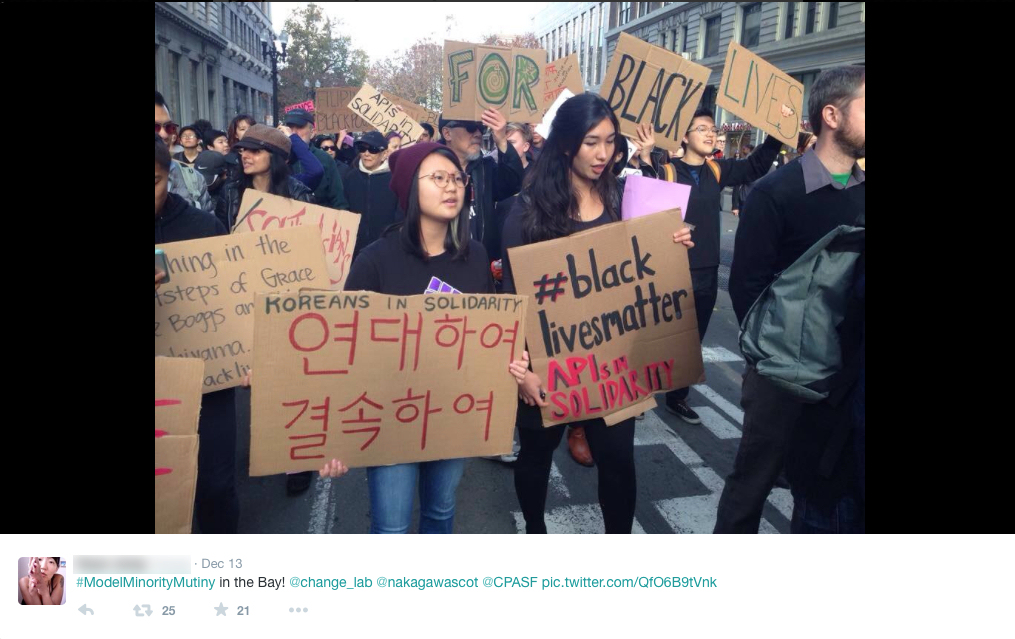
When Alton asks why Conservative discourse has demonstrated such capacity to mobilize, I respond with this: unlike Progressive AAPI discourse, Conservative discourse speaks to Chinese Americans. The ideas within their discourse is accessible to Chinese-language speakers while progressive AAPI writing arising out of our own blogosphere is largely not.
Online Progressive AAPI Discourse has — through our choice of English as our primary language of expression — marginalized a significant fraction of our own community, and for too long, we have failed to acknowledge this marginalization and its consequences to the development of AAPI thought and politics. 35% of AAPI are English-Language-Limited, and half of us rely on ethnic in-language media as a major source of news. Progressive AAPI writers like myself have simply failed to accomplish meaningful outreach to these English-Language-Limited readers. Those of us within the progressive AAPI blogosphere who might be tempted to think we speak in any way for or to Asian America must work harder to remember those who remain linguistically excluded from our own digital discourse.
Balkanization is devastating for discourse because it allows ideas to become anemic and inbred through intellectual isolation, while it also positions each of the Balkanized camps against one another rather than against an external oppressor (i.e. the larger spectre of anti-Asian racism). Those who are linguistically isolated from Progressive AAPI Discourse are done a disservice because they are offered no diversity in ideas and discussion. Meanwhile, failure to break down this Balkanization paradoxically reinforces the generalization that homogeneity of collective thought is both expected and desirable for individual AAPIs.
Progressive and Conservative AAPI ideas must be allowed to exchange so that they can challenge and inform one another, and thereby strengthen an integrated AAPI Discourse. Of course, to accomplish this, the solution begins with overcoming language barriers: by definition, English-language-limited AAPI are limited in their access to English-language only publications, whereas only 40% of second-generation Asian Americans consider themselves Asian-language proficient.
I believe the solution lies in identifying individual actors within Conservative and Progressive AAPI discourse who are willing to “reach across the aisle” and collaborate to change the linguistic isolation of our readers by broadening language access. Last year, Professor Nancy Leong drew upon her legal training to pen a powerful article on why Asian Americans should support affirmative action; notably, Leong worked with a local Chinese-language newspaper to publish her article in Chinese so that English-Language-Limited Chinese American readers could access her ideas.
Perhaps all of us within the Progressive AAPI Discourse could take a page from this book, and think about ways of breaking down language barriers to our own writing? Perhaps we should be working to develop blog plugins to provide Asian language translation services to our unique content? Perhaps we could develop a non-partisan intra-AAPI translation service for AAPI bloggers? Perhaps we need to be starting our own weibo accounts?
The point here is not to arrive at some universal AAPI political consensus on affirmative action or any other contentious issue. On the contrary, we must consider strategies for accepting and amplifying respectful differences in opinion. We must build a broad AAPI discourse — devoid of Balkanization — that includes the full spectrum of AAPI political thought. Furthermore, all AAPI — regardless of language preference — should have access to the entirety of our Discourse.
On the other hand, so long as we remain politically Balkanized and linguistically isolated, our politics will only suffer and our ideas will weaken; and in the end, some among us are never challenged to reconcile how they can support “Asian American civil rights” while opposing the basic civil right of due process — a position which makes no fucking sense whatsoever.
